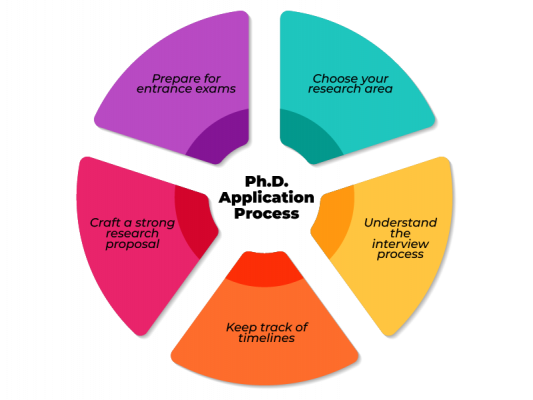Ph.D. Courses in India: Essential Insights Before You Submit Your Application

Blog / June 21, 2025
Ph.D. Course DetailsPh.D. Course InsightsAll about Ph.D. Courses in IndiaMaking the choice to enter the research world is not a small decision. If you are considering applying for Ph.D. courses in 2025, you are about to engage in an interesting yet intense transition into the academic world. The Ph.D. course landscape in India is rapidly changing, so understanding what to expect in the future, or the background is important before you "submit" your application.
Ph.D. can create opportunities whether you're interested in AI or the Arts. But let's get real - it isn't all about having three letters after your name. You need clarity about what’s expected, how to prepare, and how the research environment is changing. That’s exactly what we’ll explore here.

Ph.D. 2025–26: Key Changes
A decade ago, pursuing a Ph.D. meant sitting alone in a dusty library or research study. In present-day times, Ph.D. courses in India are dynamic and globally connected. In applying the NEP 2020 reforms around interdisciplinary collaboration and with many digital tools, India's research ecosystem is catching up with international standards.
If you are planning to pursue Ph.D. courses in 2025-26, you might be aware of:
- New eligibility pathways
- Changes in admission processes
- Shifting research priorities
- Emerging funding opportunities
These are not just ‘nice to know’— they can make or break your Ph.D. journey. Let’s unpack the essentials.
Program Overview
Ph.D., known as Doctor of Philosophy, is the highest academic degree one can pursue. It is primarily focused on research work in a specific field or specialization. It's a 3-6 years postgraduate research degree awarded after the completion of a thesis and extensive research.
Here is the general breakdown of program:
|
Aspects |
Details |
|
Ph.D. Full Form |
Doctor of Philosophy |
|
Level of Course |
Doctorate |
|
Course Duration |
3-6 Years |
|
Ph.D. Course Fees |
₹50,000 – ₹1,50,000 (Annually) |
|
Average Salary |
₹8 – ₹12 LPA |
|
Entrance Exams |
UGC NET, CSIR NET, and GATE |
Who Should Consider a Ph.D.?
A Ph.D. isn’t for everyone, and you should consider pursuing one if you:
- Love deep, sustained research
- Want to contribute original knowledge to your field
- Are comfortable with uncertainty, and intellectual challenges
- Aspire to careers in academia, research, policy, or R&D leadership
Ph.D. courses demand intellectual stamina, and curiosity. If your primary motivation is simply a higher title or career promotion, think twice.
Eligibility & Admission Essentials
Before applying, ensure you meet the basic criteria. While specifics vary by university, here’s the usual framework:
|
Aspects |
Details |
|
Minimum academic requirements |
Master’s degree with at least 55–60% marks or equivalent CGPA Some universities accept a four-year Bachelor’s with research component |
|
Entrance exams |
UGC-NET / CSIR-NET: Widely accepted across disciplines GATE: For Engineering, and some science streams University-specific entrance tests: Common in private, and state universities |
|
New flexibility trends |
Many universities now value industry experience, and interdisciplinary backgrounds. If you’ve published papers, worked in R&D roles, or contributed to innovation, highlight these in your application. |
Application Process: Step-by-Step Guide
Ready to apply? Here’s a streamlined process to follow:
- Choose your research area
Be as specific as possible — avoid vague interests like ‘management’ or ‘AI’
- Prepare for entrance exams
Use structured coaching or self-study
Focus on conceptual clarity, and practice mock tests
- Craft a strong research proposal
Show awareness of the current state of research
Clearly define your proposed contribution
Justify why your topic matters now
- Understand the interview process
Interviews test your research readiness, not just knowledge
Be prepared to discuss methodology, and potential challenges
- Timelines to track
|
Month |
Typical Activity |
|
Jan–Feb |
Research interests & supervisor shortlisting |
|
Mar–May |
Entrance exam prep & applications |
|
June–July |
Entrance exams & interviews |
|
Aug–Sep |
Final admissions & offer letters |
Structured Timeline for Ph.D. Program
What do Ph.D. courses generally look like in India today? Here's a quick breakdown:
|
Component |
Typical Duration |
Key Elements |
|
Coursework Phase |
1–2 years |
Research methodology, subject-specific papers |
|
Comprehensive Exam |
End of coursework |
Tests your readiness for independent research |
|
Thesis Phase |
3–4 years |
Original research under supervision |
|
Final Defense |
6–12 months |
Public defense of your thesis |
Ph.D. courses in India typically take 3–6 years to complete. Some universities now offer part-time, and hybrid Ph.D. options, especially for working professionals. Expect a mix of seminars, conferences, and even international exposure depending on your institution.
Roadmap for the Preparation of a Ph.D. in India
Preparation starts long before the application window opens. Here’s a roadmap:
Identify your research interests
- Start reading recent papers in your area
- Follow thought leaders, and researchers on platforms
Find potential supervisors
- Shortlist professors working on topics that resonate with your interests
- Read their recent work, and initiate polite, informed contact
Build academic readiness
- If you lack publications, aim to write at least one good paper or review article
- Take short online courses to strengthen your research, and methodology skills
Required documents
- Statement of Purpose (SOP): Clearly articulate your research vision
- Letters of Recommendation: Choose mentors who know your academic strengths well
Final Checklist for Ph.D. Applicants in 2025–26
Before you click that ‘apply’ button, take a moment to review this essential checklist:
- Academic readiness: Have you built the necessary subject knowledge and research skills?
- Research clarity & proposal strength: Is your proposal clear, focused, and original?
- Funding applications submitted: Have you explored all funding avenues ?
- Interview preparation: Are you prepared to discuss your research vision, and methodology?
- Alignment with future career goals: Does this Ph.D. align with your long-term professional aspirations?
A Ph.D. is a major life commitment - ensuring alignment now will save you regrets later.
Top Areas of Research Opportunity in India
If you’re struggling to choose your research field, here’s where the action is happening in Ph.D. courses in India:
Ph.D. in Engineering
Civil Engineering
- Sustainable Infrastructure Systems
- Water, Environment, and Climate
- Urban Network Systems
Mechanical Engineering
- Bioimplants
- Turbines
- Energy Systems
Computer Science and Engineering
- Artificial Intelligence
- Machine Learning Applications
- Data Science and Engineering
Chemical Engineering
- Microreactor Development
- Waste Utilization
- Sustainable Energy Production
Electrical Engineering
- Signal Processing and Communication
- Wireless mobile communication and networks
- RF and Microwave (Electromagnetics, Antenna) Engineering
Ph.D. in Management
- Marketing Management
- Human Resource Management
- Economics & Public Policy
Ph.D. in Natural Sciences
Chemistry
- Chemical Biology
- Chemical & Biological Crystallography
- Computational Quantum Chemistry
Life Sciences and Bioinformatics
- Parasite Biology
- Vascular Biology
- Bioinformatics
Mathematics
- Geometry
- Functional Analysis
- Probability & Statistics
Physics
- Condensed Matter Physics and Statistical Physics
- Materials Science
- Soft Matter Physics
Ph.D. in Humanities
Economics
- Development Economics
- Economic Growth
- Environmental Economics
English
- South Asia Studies
- Digital Humanities
- World Literature and Translation Studies
History and Archeology
- Archeology of South Asia
- Archeological Sciences
- Museums and Heritage Studies
Sociology
- Law and Society
- Anthropology of the Body and Mind
- Military Cultures
Many government initiatives, and private funding bodies are prioritizing these areas. Choosing a relevant, and future-proof topic can boost your Ph.D. prospects, and career options.
What’s New & Trending in Ph.D. Education for 2026
The landscape of Ph.D. courses in India is evolving faster than ever. If you’re applying in 2025–26, you’ll notice that what counted as a typical Ph.D. even five years ago has changed significantly.
Let’s explore the trends shaping tomorrow’s Ph.D. experience:
- Interdisciplinary research focus
Many Ph.D. courses now encourage cross-disciplinary projects. You might find a Ph.D. in public health that combines AI, behavioral sciences, and policy studies.
- Industry-linked and applied Ph.D. models
More universities are launching industry Ph.D. programs in collaboration with companies. These programs will help students apply research to solve real-world problems and enhance their employability.
- Hybrid and online Ph.D. opportunities
Post-pandemic, many Ph.D. courses in India offer blended models. Coursework, seminars, and even some supervision can happen online — great for working professionals.
- Global collaborations & international student mobility
Expect more joint Ph.D. programs, and collaborative research funded by international grants. Universities are building global partnerships to raise their research profiles.
- New research hubs aligned with NEP 2020
Under the National Education Policy 2020, several interdisciplinary research hubs are emerging, offering fellowships, and advanced infrastructure.
- Digital research methodologies & AI integration
Digital tools are becoming mainstream in Ph.D. research, from text mining and data analysis to tech-led simulations. This will help future researchers to get digital fluency.
Shape Your Research Future at Shiv Nadar University (Institution of Eminence)
If you are searching for Ph.D. opportunities in India that feature cutting-edge research and practical applications, Shiv Nadar University is one of the best options. The university is recognized by the Government of India as an Institution of Eminence. Shiv Nadar University is a multidisciplinary, research-based university that focuses on academic excellence in research but can also impact the real world.
What sets Shiv Nadar University apart?
- Research-intensive curriculum with interdisciplinary focus.
- Flexible Programs for working professionals.
- Globally Trained Faculty with Ph.D. and postdoctoral experience from top institutions.
- Collaborative Opportunities within the university.
- Strong Industry Interface through real-world projects and partnerships.
- Comprehensive Career Support via academic and industry networks, mentorship, and training.
- Financial & Research Support:
- Doctoral Fellowship: INR 45,000 per month for the first 2 years and INR 50,000 per month for the next 3 years
- Annual Fee Waiver: INR 60,000 toward tuition and INR 60,000 toward hostel fees
- Research Travel Grant: INR 1,50,000 for attending Scopus-indexed conferences (domestic/international)
Ready to take the next step? Choose Shiv Nadar University to simplify your Ph.D. journey and build a career that truly matters.
Final Thoughts
Pursuing Ph.D. courses in India is more than just a degree. It's about shaping the future via meaningful research and innovation. The landscape of Ph.D. in India is opening new doors for researchers by evolving the admission process, interdisciplinary opportunities, and growing industry relevance. Start your Ph.D. journey with Shiv Nadar University!
FAQs
- How long do Ph.D. courses in India typically take?
Most Ph.D. courses in India take between 3 to 6 years, depending on discipline, and research progress.
- Do I need to clear NET to apply?
For most public universities, yes — NET or an equivalent exam is required. Some private universities conduct their own tests.
- What is the average salary of Ph.D. holder?
The average salary for a Ph.D. holder in India generally ranges from around ₹8 – ₹12 LPA.